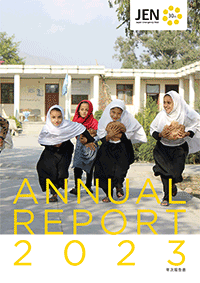Electricity in Za’atari Camp
In a camp that accommodates approximately 100,000 refugees, the cost of utilities can also be exorbitant. The camp residents receive certain utilities, such as water and electricity for free, provided by various organizations, including UNHCR and UNICEF.
Water is trucked daily into various public water tanks, where refugees can come and collect their share of the water. Electricity is provided for main services in the camp; however, refugees often make illegal connection by connecting their wires from the main line to their individual households.
[Illegal wires are connected to the main electricity line]

Because of these individual connections, electricity bill exceeds USD 500,000 a month, which takes up a large portion of the operational fee of Za’atari Camp. In particular, majority of the electricity is being consumed in one area of the camp: Champs Elysees Market Street.
Champ Elysees Street is home to about 600 shops in the camp. These shops sell anything from food to clothes to electric appliances like washing machines, TVs, fans and even more computer game stations where children enjoyed playing games against each other. Seeing these developments, it is no wonder that the electricity usage in the camp is very high.
[Electronic appliance store on Champs Elysees Street]

[At the game arcade, children enjoy playing computer games]

Because of these large costs required to run a refugee camp and the uncertainty related to how long the refugee camp will stay open, there is a dire need to consider adopting an assistance strategy focused on cost recovery. To do this, there is a need to foster an environment where able refugees, particularly shop owners, begin paying for their own share of electricity and water usage. As a first step, UNHCR will be setting a few hours during the day where they cut of the electricity in the camp to reduce the amount of electricity consumption and to introduce the idea of the payment system to refugees.
As a long-term camp management requires a strong engagement from the refugee community, these new developments are being implemented with close coordination with refugees. Not only electricity, but these longer-term planning is also necessary for water provision in the camp. As JEN is a partner WASH actor in three districts, we continued to work with UNICEF, other WASH actors and the refugee community to improve ways water is delivered and distributed, in order to make lives in the camp more comfortable and sustainable.
【JEN is now accepting donations. Your help would be very much appreciated.
DONATE here】
【Click here to know more about JEN 20th Anniversary innitiative】

![Jordan[Syrian refugees] Blog](/en/project/images/mainimg_project_jordan.jpg)




